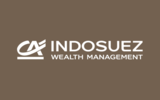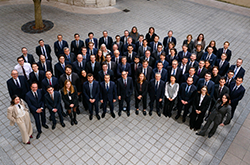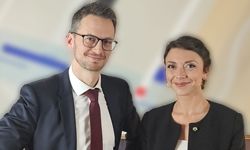Marc-André Poirier, CEO of Indosuez Switzerland, Interview with Allnews
How Indosuez is becoming a leader in wealth management in Europe
Following the completion of the takeover of Banque Thaler, Marc-André Poirier, CEO of CA Indosuez (Switzerland) SA, outlines his ambitions and market trends in an interview with Emmanuel Garessus, from the Swiss media outlet allnews.
Indosuez Wealth Management is one of Europe's fastest-growing private banks. This wealth management subsidiary of the Crédit Agricole Group manages €215 billion in assets (+€4.5 billion in assets under management in 2024) and employs 4,300 people.
In Switzerland, Indosuez focuses on the Swiss, Middle Eastern, and Asian markets. It is active in the areas of wealth management, commodity transaction financing, and commercial banking. The bank has more than 800 specialists based in Geneva, Zurich, Lugano, Asia, and the Middle East. In 2024, its net profit amounted to CHF 57.4 million and its operating profit to CHF 68 million, with equity capital of CHF 1.54 billion.
Following the acquisition of Belgian bank Degroof Petercam last June, Indosuez Wealth Management has just finalized the takeover of Banque Thaler, with 42 employees in Geneva and Zurich and CHF 3 billion in assets under management. Marc-André Poirier, CEO of CA Indosuez (Switzerland) SA, answers Allnews' questions about his strategy and development.
- How have Indosuez Wealth Management's assets under management evolved over the past three years?
Our assets are on a positive trajectory, with a sharp acceleration last year (+26% vs. 2023). But the most important thing is our ability to attract new clients and high-quality assets.
- How does the acquisition of Banque Thaler mark a milestone in your development in Switzerland?
This acquisition is fully in line with Indosuez Wealth Management's development strategy by strengthening its position in the Swiss market, the global center for wealth management, where Indosuez has been present since 1876. Banque Thaler, founded in 1982, is recognized for the excellence of its services and its long-term expertise in wealth management.
Furthermore, with the acquisition of the Belgian bank Degroof Petercam, Belgium has become Indosuez's leading market. This acquisition marked a real turning point for the bank and opened up Northern Europe to the Crédit Agricole group. Banque Thaler has a client base that is heavily focused on Luxembourg, Belgium, and the Netherlands. The acquisition of Thaler is therefore in line with our strategic interests, as was the acquisition of Degroof Petercam.
- What are the differences between the acquisitions of Thaler and Degroof Petercam?
The first difference is the size of the acquisition. With the integration of Degroof Petercam, Indosuez increased its indicators by a third overall, while the impact of the Thaler acquisition is much more limited.
Furthermore, in terms of clientele, while Degroof Petercam is a well-known institution in Belgium with a local client base, Thaler tends to serve a non-resident international clientele. Both are excellent brands, and these acquisitions are therefore highly complementary.
But the most important factor is the common culture we share with Banque Thaler, which will enable us to better meet our clients' expectations.
- Would it be fair to say that Indosuez is in an acquisition phase?
With the acquisition of Degroof Petercam, this transaction in Switzerland, and the recent announcement of the planned acquisition of BNP Paribas' wealth management client base in Monaco, the Indosuez Group has taken on a new dimension and is now establishing itself as a leader in wealth management in Europe and a market consolidator.
However, when it comes to our development, our priority remains above all organic growth, and when we consider external growth opportunities, we have very strict criteria.
Today, we are delighted to announce the completion of the acquisition of Thaler, and our priority will now be to integrate the 42 employees and enable clients to benefit from our wide range of services.
- In your press release, you talk about seizing “new opportunities.” Can you specify your objectives more precisely?
The quality and expertise of the Thaler teams are widely recognized. They have built strong, long-lasting relationships with their clients. Thaler has recognized management expertise, particularly in discretionary management. This merger with Indosuez will allow clients to benefit from the best of both worlds: a local, human-scale bank and access to a wider range of products and services, as well as the opportunity to benefit from the Group's solidity, its international network, and its multiple capabilities in financing, corporate finance, fund servicing, and management.
- Will you be retaining all of Banque Thaler's staff?
The philosophy behind this project is not one of restructuring but rather one of growth: following Indosuez's record year in Switzerland last year, we continue to grow and need all our quality resources.
- What is your footprint in Switzerland in terms of assets under management and headcount?
We manage approximately CHF 44.5 billion in assets (excluding Banque Thaler, as of December 31, 2024), which places Indosuez among the top three foreign banks in Switzerland. With its subsidiaries Amundi, CA Next Bank, and CACEIS, the Crédit Agricole Group covers almost all sectors of the economy and is one of the leading financial groups in Switzerland.
Indosuez's unique position in Switzerland also enables it to manage other regions such as Asia-Pacific, with branches in Hong Kong and Singapore, the Middle East, with branches in Dubai and Abu Dhabi, and Latin America. It has a highly developed international network managed from Switzerland, the nerve center of international private banking.
- Could this Switzerland-centric structure be called into question in the short or medium term?
We have been in Switzerland since 1876. Our client base is very solid and we manage family wealth from generation to generation. The current organization works perfectly.
- Are new geopolitical constraints and trends in management models brought about by new generations changing your model?
On the geopolitical front, it does appear that more and more clients from the Middle East are reallocating assets to Switzerland. Switzerland remains by far the world's leading safe haven, renowned for its stability.
The second challenge concerns the transfer of wealth to the next generation. Our “NextGen” program supports this client segment. These are the children of our clients or successful young entrepreneurs who have different expectations and are looking for greater diversification, particularly in real assets such as private equity or real estate.
- Your role sometimes seems to go beyond that of a banker…
We advise our clients at every key moment in their lives, in both their personal and professional needs, which are often linked. In wealth management, it is necessary to have a global vision of the issues at stake in order to advise clients in the best possible way. Clients expect a close relationship with competent, available, and attentive managers. This applies to everyone from account managers to the CEO. In my opinion, the profession must remain “embodied.” This means supporting our clients over the long term, in the conduct of their business and its transfer. Very few institutions achieve this. Our goal is to build a loyal and lasting relationship, in every sense of the word.
When I receive clients here in Geneva, I write them a “Love Letter,” a well-structured letter in which I address them in a very personal way. This is a practice that has been forgotten in the anonymity of today's digital relationships.
- Amundi is part of the Crédit Agricole group. Do Indosuez clients have a large proportion of Amundi products in their portfolios?
Indosuez's architecture is completely open. We offer our clients our own funds, but above all we want to offer them the best-performing funds on the market and those that best match their objectives and risk profile. Being part of the same group is a real asset!
- Is what you call the “Swiss safe” weakened when a client leaves the country for tax reasons, for example? Is capital still coming into Switzerland or is it leaving the country?
We have not recorded any capital outflows from Switzerland. On the contrary, international clients are still seeking the country's fiscal, political, and monetary stability. In many rankings, Switzerland remains the leader in international wealth management with more than $2 trillion.
- In terms of real estate, will you be concentrating your teams in a new location?
At a time when many of our competitors have decided to move to the outskirts of Geneva, we have made a bold choice: to invest and expand in downtown Geneva. Our teams are therefore based in two buildings: the Quai Général Guisan, a historic flagship that houses our investment banking activities, and our building on Rue du Stand, the new flagship for wealth management. It is in the latter that Thaler's Geneva teams will join the Indosuez teams. The investment in the city center meets three objectives: to offer a high-quality customer experience, to ensure the well-being of our employees, and to remain close to the cultural heart of the city.
- Are there any places in Switzerland where you would like to strengthen your presence?
We would like to further consolidate our footprint in German-speaking Switzerland, particularly in Zurich. The Crédit Agricole Group is expanding there through its subsidiaries Amundi, CA Next Bank and CACEIS, among others, and there are many synergies. We have already recently strengthened our corporate and investment banking activities there. Extending our coverage to German-speaking Swiss clients will play a central role in our growth strategy in Switzerland.
- What are your objectives for 2025?
Our first objective will obviously be to successfully integrate the Banque Thaler teams.
Then, we will of course continue our ongoing projects, with the aim of serving our clients even better and going further in terms of personalization and tailor-made services, particularly in supporting and anticipating our clients' expectations.
As for client acquisition, I repeat: we favor reasonable, solid long-term growth that ensures high-quality service for our customers.
- Indosuez's growth in wealth management is sometimes compared to Amundi's growth in asset management. What do you think about that?
We are part of the same Group and operate in different areas, but there is no reason why Indosuez should not follow in Amundi's footsteps. The quality of the Crédit Agricole name, one of the world's most solid banks, means that many high net worth clients turn to us for complex transactions, or because they have confidence in the Group's solidity. The figures prove it: Indosuez is a solid, growing subsidiary.
- In terms of customer geography, where are the gaps?
It's not a question of gaps, but of choices. Indosuez is present in 15 strategic territories, notably in Europe, Switzerland, Luxembourg, the Middle East, and Asia. I strongly believe in the potential of the Asian market. I was recently in the region, where we have everything we need to grow further.
- You speak Japanese and have had a career in Asia. How can a private bank make progress in this region at a time when three separate blocs are emerging in the world?
The more tensions with the United States escalate, the more the need to protect and diversify assets will become a priority. This is the case in Taiwan, where the wealthiest individuals are moving their capital out of Asia, for example from Singapore to Switzerland. I am seeing these trends of capital flows towards an island of stability such as Switzerland in most of the markets where we operate.
Asia and the Middle East are a magnificent “patchwork,” but you can't manage clients in Singapore the same way you manage clients in China, Malaysia, or Thailand. Our presence in Asia and the Middle East allows us to cover strategic areas and offer these clients a value proposition that perfectly matches their expectations.
- Does the fact that you are a French group at a time of great uncertainty about French public debt hinder your desire to grow?
I don't think so. I think that the recent acquisitions, which we have discussed in this interview, prove that this is not the case. We are a growing group, despite the current uncertain environment.
In Switzerland, we are a Swiss bank. We are not a branch of a French group, but a subsidiary. I would add that Crédit Agricole is a very solid bank, the 10th largest in the world in terms of balance sheet, with a unique business model.
- Are you involved in the development of cryptocurrencies?
We are acting with great caution with regard to cryptocurrencies. Cryptocurrencies operate in a changing environment that is not entirely transparent. There is still too much uncertainty surrounding these new investments.
Furthermore, customers who want to invest in cryptocurrencies do not need us to do so. We are considering how to support this trend and are obviously keeping a close eye on developments, but we remain very cautious about virtual currencies.
September 01, 2025




